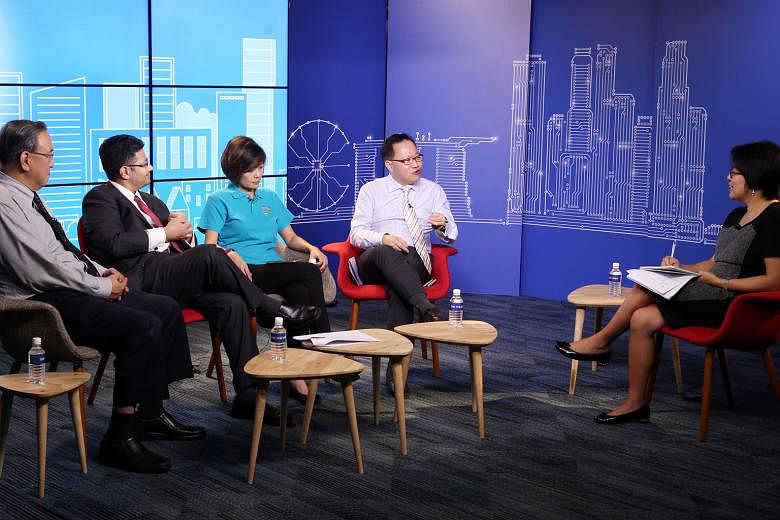A cultural aversion to venturing outside the box and a lack of confidence are holding Singapore back from realising its full potential as an innovation hub.
Panellists at The Straits Times' post-Budget roundtable said the country already has much to be proud of in innovation, but the dare-to-try mindset needs to become more pervasive. The four panellists were gathered to discuss Budget 2017, in a session moderated by The Straits Times' Business editor Lee Su Shyan.
This year's Budget built on the report by the Committee on the Future Economy (CFE), which laid out recommendations to prepare Singaporeans for a more uncertain road ahead, with a strong focus on encouraging more home-grown innovation and intellectual property development.
For instance, the Budget contained announcements of new programmes to help smaller firms embrace digitalisation, as well as a new Global Innovation Alliance for Singaporeans to gain overseas experiences, build networks and collaborate with their counterparts.
NTUC assistant secretary-general Cham Hui Fong and UOB chief economist Jimmy Koh raised concerns that Singapore is not seen as having an innovative culture.

"(There are) a few good examples but the bulk of the population is still perceived as process-driven, rather than as entrepreneurs," Mr Koh pointed out.
This approach has worked well for Singapore in past decades but might not be effective in an increasingly fast-moving, volatile world.
"Our strategy (in the past) was really to be a place where multinational companies (set up shop)," he noted. "But today, that model has become one in which they design the product, we enhance the processes. So we are very good at enhancing the value of the supply chain but not creating new value."
The CFE's recommendations and the Budget aim to overcome this by creating a more collaborative environment - with government agencies, research institutes and the private sector working together.
Said Mr Koh: "When everybody comes together to bounce off ideas... You can look at what other people do, even in different industries. The key is not to copy what has been done, it's to understand the principle behind that change."
Part of this unwillingness to take risks stems from Singapore's comfortable environment, some panellists noted.
"If our kids say, 'Okay, I'm going to work for this MNC or this bank,' their parents say, 'Okay, go for it.' But if they say, 'I'm going to start my own business,' their mum will say, 'Are you sure?' ," Mr Koh said.
-
THE ROUNDTABLE PANEL
-
MR JIMMY KOH, UOB chief economist
MR NICK NASH, group president of tech firm Garena
MR GERARD EE, chairman of the Charity Council and president of the Institute of Singapore Chartered Accountants
MS CHAM HUI FONG, NTUC assistant secretary-general
-
THE MODERATOR
-
MS LEE SU SHYAN, The Straits Times Business editor
But other panellists said Singapore already has quite a bit to offer when it comes to innovation and new ideas. "Sometimes, we short- change ourselves," said Mr Gerard Ee, president of the Institute of Singapore Chartered Accountants.
"(As an auditor) I have seen some things my clients have created - but these innovations are often created for large multinationals and not credited to Singapore companies," he said, adding: "Years ago pop-up storybooks were very popular. They were created in Singapore - we were the largest manufacturers of (them). But contractually the company had to export every one of them. So people didn't know Singapore companies can be creative."
Mr Ee, who is also the chairman of the Charity Council, added: "We need to ferret out these stories of (innovative companies) and give Singaporeans the confidence. We should also help them to scale up."
TIME TO RECOGNISE SUCCESS
Mr Nick Nash, group president of technology company Garena, described Singapore as an "INTJ (Introversion, Intuition, Thinking, Judging) country" on the well- known Myers-Briggs Type Indicator assessment.
"We are an introverted, technical, rational country. We do lots of quiet innovation that's more than just process innovation. We take some real risks, we do some pretty amazing things," he said.
The idea that Singapore is lacking in innovation has "a demotivating impact on how we think about ourselves". "A little bit of confidence goes a long way to being willing to take the occasional risk," he added.
The panellists also discussed how to ensure the push to become more innovative remains an inclusive process.
Events such as Britain's vote to leave the European Union and the election of Mr Donald Trump as President of the United States underscore the importance of making sure large swathes of the population do not feel left behind, said Mr Koh.
While it is vital to prepare workers for the future by equipping them with key skills, "in many ways the discussion on SkillsFuture and training the workforce is precisely the conversation you have when (a large share) of your economy is geared towards MNCs or the supply chain", said Mr Nash.
An equally important discussion is one about the structure of Singapore's future economy, "as we take more and more control of our own industrial destiny, not simply being offices for MNCs but also producing our own MNCs from Singapore".
"Skills are always the foundation, but we should also think about the kind of (economy) we want to live in. Inclusive financial growth comes at a cost, but it has the possibility of broadening the tax base, with everyone doing very well."


